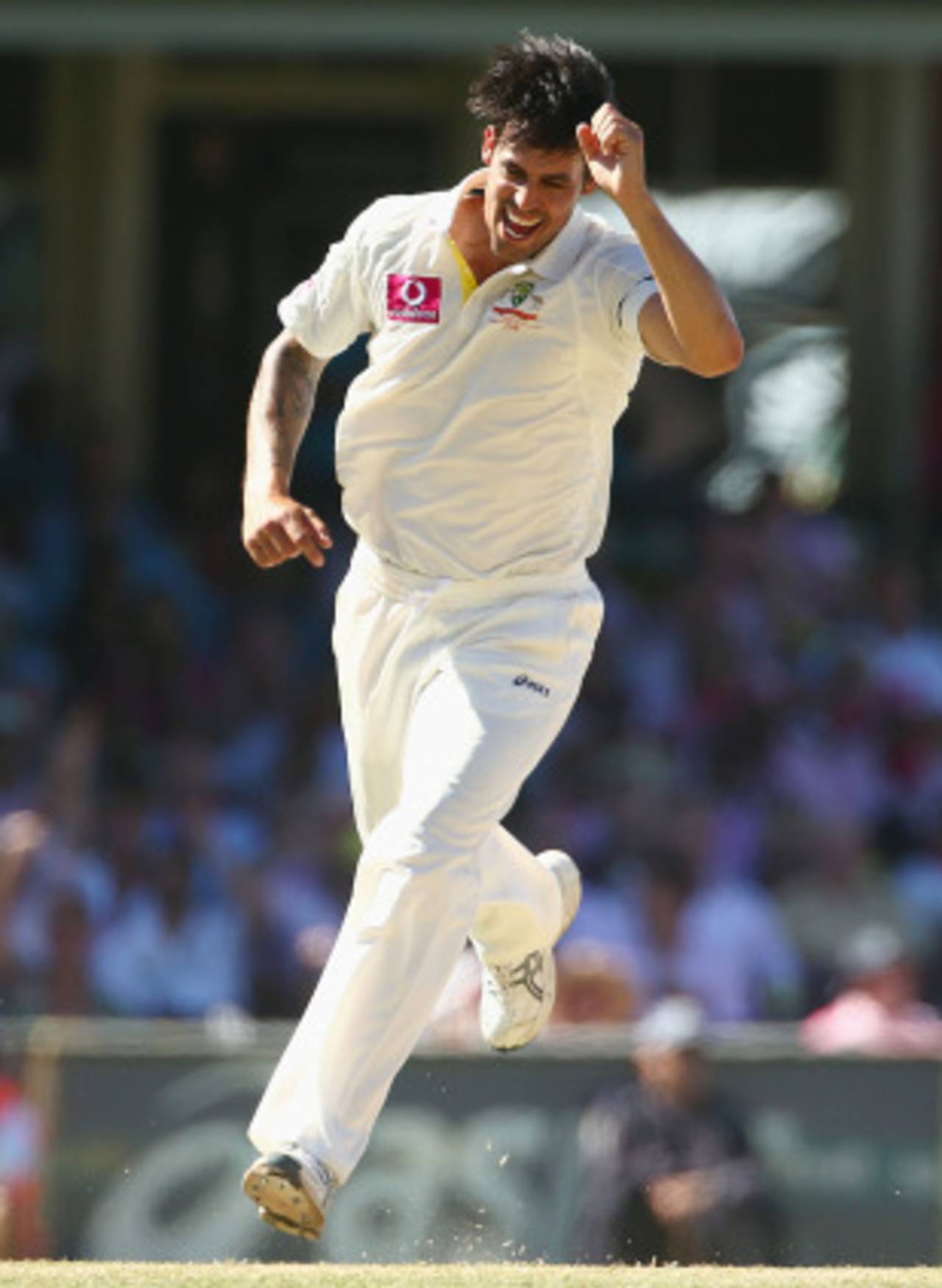We'll miss Mitch
Risky or not, Johnson is thrilling in his unpredictability. More's the pity we won't see him this Ashes
Jon Hotten
29-Apr-2013

Mitchell Johnson: rivetingly wonderful and awful in turn • Getty Images
I'll miss Mitchell Johnson on Australia's Ashes tour, and not for the obvious reason. It's easy to buy into the caricature of him as Barmy Army fall guy, the symbol of a new and flaky Australia. Yet a closer reading reveals a far rarer creature, one that we see little of in the game: the genuinely erratic international cricketer.
To try to define it more accurately, the gap between Johnson's peak performances and his quotidian ones is far greater than for most international players, who have usually made it through the sheer consistency of their game.
England had a long flirtation with their own Mitch-alike in Steve Harmison, a bowler capable of taking 7 for 12 or delivering one to second slip. Careers like Johnson's or Harmison's can go into a long, slow tailspin, the memories of their most devastating moments exerting a powerful grip on the collective imagination and a yearning for them to be repeated. They are our old boxers, flat-nosed and battered but always just one punch away from redemption.
There is a rightly famous passage in Nick Hornby's book Fever Pitch where he describes the career of an almost-forgotten Arsenal defender called Gus Caesar. At first it is one of unbroken success: he's the best player in his class, then the best player in his school, and the best in the district. He goes to Arsenal as a trainee and is better than all of the other trainees in his position, better than all of the other reserves, better than everyone else in the country of his age. He plays for England U-19s, he gets into the Arsenal first team and holds his place. Then he has one catastrophic game, which happens to be in a cup final. The crowd begin to sing songs about him, every small mistake is amplified, and this becomes his reputation. He loses his place at Arsenal and moves to a series of ever-smaller clubs, ending his career ten years later with Hong Kong Rangers.
In one way, Gus Caesar's story is the story of almost every sportsman, of every cricketer. Their talent finds its limit. For some it falls into a hinterland between two places: too good for club cricket, perhaps, but not good enough for a county. For others, it's a more subtle divide, the difference between very good and great; of being a match-winner one day and an also-ran the next. The size of their hinterland is measured by the gap between their best and their worst.
Mitch Johnson is an exceptional case. His very best can be utterly devastating. He can, and has, won Test matches in a couple of hours, and his most impactful performances come out of nowhere, with no rhyme or reason save for his own internal rhythm. The same is true of his worst, where his errors are amplified by the scale of their awfulness. No one that good should be that bad. How, you think, can this be the same man?
Imagine going out to face a man capable of such great and terrible things, not knowing which you are going to get
And yet there is something compelling about it. In a game decided by legions of grunts "executing their skills" for slim advantage, Johnson is thrilling in his unpredictability. Imagine going out to face a man capable of such great and terrible things, not knowing which you are going to get.
The received wisdom on Australia's Ashes squad is that the batting is brittle and the bowling dangerous, yet that bowling is equally callow. Without Johnson, who has 205 Test wickets, the most experienced seamer is the doughty Peter Siddle, with 150. The rest is promise and guesswork, fraught with inexperience and injury. Ryan Harris is a latter-day Simon Jones, a match-winner who can't get on the park. At 33, he has played 12 Tests; the mere announcement of the squad was enough to twang his Achilles. The rest have 81 wickets between them.
Mitch has worked hard to remake himself. His new action, with wrist ticking back and forth as he runs up, a villainous black fringe obscuring his eyes, makes him look like a Pixar baddie, and he has delivered some torrid spells. Jonathan Agnew suggested that the crowd, and even the famous Mitchell Johnson song, had played a role in his non-selection, and he is probably right.
Talent in so many ways is an unknowable thing. Hornby concluded his passage on Caesar like this:
"Gus clearly had more talent than nearly everyone of his generation and it still wasn't quite enough. Gus must have known he was good, just like every pop band who has ever played the Marquee know that they are destined for Madison Square Garden, and just as any writer who has sent off a completed manuscript to Faber and Faber knows that he is two years away from the Booker. You trust that feeling with your life, you feel the strength and determination it gives you coursing through your veins like heroin... and it doesn't mean anything at all."
Somewhere in there is the truth about Mitchell Johnson. He might be a risk but he would enliven the series, and for all of the singing and the barracking, the crowds understand what he can do. That's sort of the point. The joy and the fear is in waiting to see if he can do it. With Shane Watson on hand, he's not even the flakiest player available to Australia. For cricketing reasons, Mitch, you will be missed.